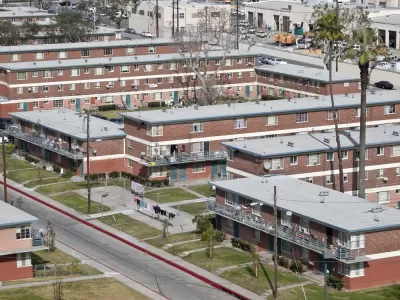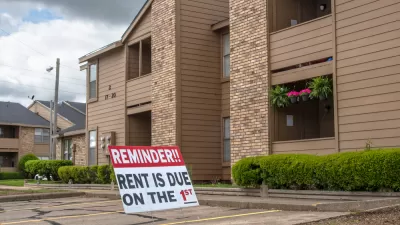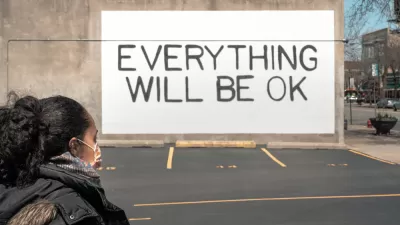The economic disruption of the pandemic has strengthened public support—even among Republicans—for an ambitious social housing program at the federal level, according to the findings of a recent report.

Doug Trumm shares news of "The Case for Social Housing," a report published in November by the Justice Collaborative Institute and written by Daniel Aldana Cohen and Mark Paul.
The report "calls for the federal government to reverse that in a big way and produce twelve million social housing units by 2030, echoing a proposal from Rep. Ilhan Omar (D-Minneapolis)," according to Trumm.
"There has never been a better time to invest in a substantial buildout of social housing,” according to passage selected by Trumm to highlight the arguments of the report. "The A collecting, or waiting for, unemployment benefits. Industrial capacity is running 30% below potential, meaning plenty of factories could be kicked into gear to churn out building essentials."
An earlier article by Kriston Capps also picked up the news of the report, parlaying the report's argument into some informed speculation about the likelihood that the Biden administration might restore the federal government's role in developing social housing—a role mostly abdicated at the federal level since the Regan administration.
According to the report, the coronavirus pandemic has strengthened public support for the idea of the federal government developing social housing. "A recent poll conducted by the Justice Collaborative Institute and the left-leaning policy shop Data for Progress finds that 63% of likely voters support federal investment in social housing," writes Call to summarize the public support claimed in the report. "Some 56% of Republicans said they would support social housing (along with nearly 80% of Democrats)."
According to Capps, the Biden administration will face a narrow window of opportunity to set an agenda amidst a wide variety of needs and multiple crises. According to the report, a large federal investment in social housing could meet multiple needs at once.
FULL STORY: Should Biden Go Big on Public Housing?

Study: Maui’s Plan to Convert Vacation Rentals to Long-Term Housing Could Cause Nearly $1 Billion Economic Loss
The plan would reduce visitor accommodation by 25,% resulting in 1,900 jobs lost.

North Texas Transit Leaders Tout Benefits of TOD for Growing Region
At a summit focused on transit-oriented development, policymakers discussed how North Texas’ expanded light rail system can serve as a tool for economic growth.

Why Should We Subsidize Public Transportation?
Many public transit agencies face financial stress due to rising costs, declining fare revenue, and declining subsidies. Transit advocates must provide a strong business case for increasing public transit funding.

How Community Science Connects People, Parks, and Biodiversity
Community science engages people of all backgrounds in documenting local biodiversity, strengthening connections to nature, and contributing to global efforts like the City Nature Challenge to build a more inclusive and resilient future.

Alabama: Trump Terminates Settlements for Black Communities Harmed By Raw Sewage
Trump deemed the landmark civil rights agreement “illegal DEI and environmental justice policy.”

Dear Tesla Driver: “It’s not You, It’s Him.”
Amidst a booming bumper sticker industry, one writer offers solace to those asking, “Does this car make me look fascist?”
Urban Design for Planners 1: Software Tools
This six-course series explores essential urban design concepts using open source software and equips planners with the tools they need to participate fully in the urban design process.
Planning for Universal Design
Learn the tools for implementing Universal Design in planning regulations.
City of Santa Clarita
Ascent Environmental
Institute for Housing and Urban Development Studies (IHS)
City of Grandview
Harvard GSD Executive Education
Toledo-Lucas County Plan Commissions
Salt Lake City
NYU Wagner Graduate School of Public Service





























